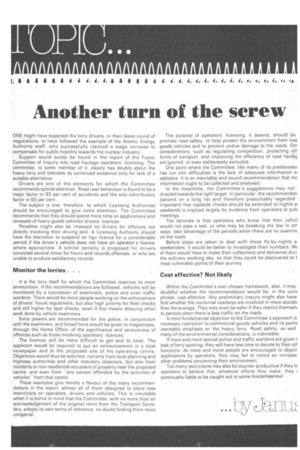Another turn of the screw
Page 58

If you've noticed an error in this article please click here to report it so we can fix it.
ONE might have expected the lorry drivers, in their latest round of negotiations, to have followed the example of the Atomic Energy Authority staff, who successfully claimed a wage increase to compensate for public hostility towards the nuclear industry.
Support would surely be found in the report of the Foster Committee of Inquiry into road haulage operators' licensing. The committee, or some member of it, clearly has doubts about the heavy lorry and tolerates its continued existence only for lack of a suitable alternative.
Drivers are one of the elements for which the Committee recommends special attention. Road user behaviour is found to be a major factor in 95 per cent of accidents and the sole contributory factor in 65 per cent.
The subject is one, therefore, to which Licensing Authorities should be encouraged to give extra attention. The Committee recommends that they should spend more time on applications and renewals of heavy goods vehicles drivers' licences.
Penalties might also be imposed on drivers for offences not directly involving their driving skill. A Licensing Authority should have the discretion to suspend an hgv licence for a considerable period if the driver's vehicle does not have an operator's licence where appropriate. A similar penalty is proposed for drivers convicted several times for hours and records offences, or who are unable to produce satisfactory records,
Monitor the lorries. . .
It is the lorry itself for which the Committee reserves its main ammunition. If the recommendations are followed, vehicles will be monitored by a succession of examiners, police and even traffic wardens. There would be more people working on the enforcement of drivers' hours regulations, but also high priority for fleet checks and still higher for spot checks, even if this means delaying other work done by vehicle examiners.
Extra powers are recommended for the police, in conjunction with the examiners, and broad hints would be given to magistrates. through the Home Office, of the significance and seriousness of offences such as those involving operators' licences.
The licences will be more difficult to get and to keep. The . applicant would be required to put an announcement in a local newspaper and at the proposed site of his operating centre. Objections would thus be solicited, not only from local planning and highway authorities and other statutory objectors, but also from residents or non-residential occupiers of property near the proposed centre, and even from "any person offended by the activities of vehicles"' from that centre.
These examples give merely a flavour of the many recommendations in the report, almost all of them designed to place new restrictions on operators, drivers and vehicles. This is inevitable when it is borne in mind that the Committee, with no more than an acknowledgement of the original remit from the Transport Secre tary, adopts its own terms of reference, no doubt finding them more
congenial.7:j,-1
The purpose of operators' licensing, it asserts, should be promote road safety, to help protect the environment from hea goods vehicles and to prevent undue damage to the roads. 0th considerations, such as regulating competition, protecting oth forms of transport, and improving the efficiency of road haulag are ignored, or even deliberately excluded. One point where the Committee, like many of its predecessoi has run into difficulties is the lack of adequate information al statistics. It is an inevitable and sound recommendation that mc information ought to be collected and analysed.
In the meantime, the Committee's suggestions may not directed towards the right target. In particular, the recommendatii (second on a long list and therefore presumably regarded important) that roadside checks should be extended to nights al weekends is inspired largely by evidence from operators at pub meetings. The rationale is that operators who know that their vehicl would not pass a test, or who may be breaking the law in otf ways, take advantage of the periods when there are no examint on the roads.
Before steps are taken to deal with these fly-by-nights al weekenders, it would be better to investigate their numbers. Mt of them would have to make their collections and deliveries duni the ordinary working day, so that they could be discovered at t most vulnerable points of their journey.
Cost effective? Not likely
Within the Committee's own chosen framework, also, it may doubtful whether the recommendation would be, in the currt phrase, cost effective. Any preliminary inquiry might also have find whether the nocturnal cowboys are involved in more accider than the average. They may even be safer if they restrict themsek to periods when there is less traffic on the roads.
A more fundamental objection to the Committee's approach is necessary restriction to commercial goods vehicles and its perha inevitable emphasis on the heavy lorry. Road safety, as well many of the environmental considerations, is indivisible.
If more and more special police and traffic wardens ard given t task of lorry spotting, they will have less time to devote to their ott functions. As more and more people are encouraged to object applications by operators, they may fail to notice an increase other problems concerning their environment.
Too many restrictions may also be counter-productive if they le operators to believe that, whatever efforts they make, they r continually liable to be caught out in some misdemeanour.




































































































